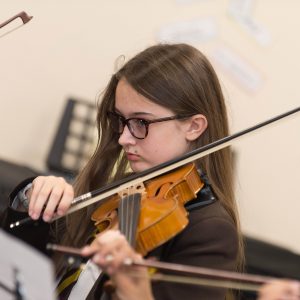Music
Introduction
As you may know we have an enviable and rich variety of music taking place at HGS. So if performing or composing is your thing, GCSE Music is the obvious direction to choose. Whether you are a traditional clarinettist, a singer or a rock guitarist or if you wish to develop some music technology skills this course is available to you.
What will it be like?

Edexcel GCSE music focuses on the three primary activities you will have become familiar with – Performing, Composing and Appraising. You will be required to perform both solo and in an ensemble, and compose two pieces. You will also learn about four areas of study – Instrumental Music, Vocal Music, Fusions and Music for Stage and Screen culminating in a listening and appraising exam. These key aspects will be studied throughout all parts of the course and will form the basis of your coursework and examinations. During year 9 we will particularly focus on integrating and developing performing, composing and appraising skills, along with increasing student’s understanding of music theory and composition.
Whilst the course naturally attracts instrumentalists and vocalists, and previous theoretical knowledge is an advantage, no previous music exam grades are required. You should however be performing at the equivalent of ABRSM grade 2 or higher as you start the course or regularly achieving Gold performing grades in your year 8 lessons.
Assessment
Performing music (30%)
During the course you will have to record TWO performances – one ‘solo’ and one as part of an ‘ensemble’. In some cases these may have been prepared for a concert or show. There will be numerous performance opportunities across both years which will all be recorded and you pick the best ones to submit. The total time of the two performances combined is four minutes of music equivalent to ABRSM grade 4 standard or higher. You can play alongside any musician (e.g. staff, students, friends etc) or if you perform out of school (e.g. stage school, rock group, local choir etc) these could also be used. Performances do not have to be in public and there are no sight-reading tests or scales. Remember we have an excellent peripatetic instrumental staff to help you and a wide range of regular ensemble opportunities available to join.
Composing music (30%)
During the course you will have to compose TWO pieces of a combined duration of three minutes. One composition is a free choice and the other is in response to a brief set by the exam board which relates to the areas of study. Whether you compose a string quartet, a rock song or a film score with beats and samples this part of the course is very free to explore your style and creativity. Compositions are mainly completed in school time. You may use music technology software such as Sibelius, Cubase or Audacity – or you could create and record your piece using the recording studio – or maybe you could just simply use good old-fashioned pencil and paper!
Appraising music (40% externally marked)
This is the only examination part of the course and is taken at the end of Year 11. The 1 hour 45m exam draws on music taken from the eight set works, plus one unfamiliar piece. The eight set works link to each of the four Areas of Study mentioned above and includes pieces by Bach and Beethoven, music from the show Wicked and the film Star Wars, pop music by Queen and two fusion pieces with mixtures of Jazz, Samba, African drumming and sampling in them. The test covers breadth as well as depth of knowledge and builds upon much of the work you have already been developing in years 7 and 8.